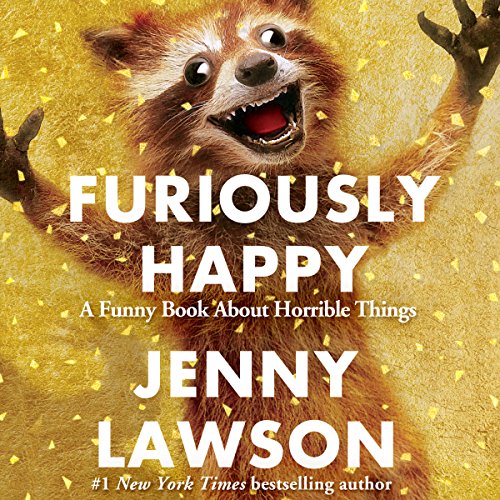
I’d like to get back to writing real reviews rather than mini-reviews – at least for some books. I’ll use a line of questioning outline in Susan Wise Bauer’s The Well Educated Mind.
Summary: Blogger Jenny Lawson writes an hysterical memoir about her adventures while trying to be furiously happy. She is a warrior for destigmatizing mental illness, and this subject is the main point of her memoir. She wants to be furiously happy rather than wallowing in self-pity.
Review:
👽 Is there meaning to the title or cover?
Yes, the cover is a happy raccoon, which represents her own stuffed raccoon which she uses for all sorts of pranks and shenanigans. (She is a taxidermist.)
The title is the main point of her book – instead of wallowing in self-pity about mental illness, we should try to be furiously happy despite the mental illness. Let go of our inhibitions and be happy in the face of adversity (and especially the face of people who don’t like you).
👽 What are the central events of the book?
It’s hard to pinpoint the central events of this book. It, of course, centers around her deciding to be furiously happy – so she starts going on adventures even though they are outside of her comfort zone. Adventures like going to Australia despite her agoraphobia. Fun like wearing a koala suit while going to see the koalas.
👽 What historical events coincide – or merge – with these personal events?
Well, the book was written around 2015, so I’d say the major events that were going on in Obama-era times was the Great Recession, though I don’t recall her mentioning it.
👽 Who is the most important person (or people) in the writer’s life? What events form the outline of that story?
Her husband is the most important person in her life – considering how many times he was mentioned in the memoir. He is a Republican, and she is a Democrat; he is sensible, and she is often irrational.
👽 What is the theme that ties the narrative together?
The theme of the book is being furiously happy, of course. 🙂
👽 Where is the life’s turning point?
In this memoir, it’s when she decides to become furiously happy.
👽 For what does the writer apologize? In apologizing, how does the writer justify?
The writer doesn’t really apologize, but I suppose she offers excuses for being so deeply depressed that she had to decide to be furiously happy out of spite. She justifies this by having an array of mental illnesses and sleeping disorders. She also excuses herself for bugging her husband with shenanigans by pointing out that it’s her way of fighting her depression.
👽 What is the model – the ideal – for this person’s life?
The ideal, I guess, would be perfect mental health. But that’s not going to happen, so she settles for being furiously happy.
👽 What is the place where the writer has arrived, found closure, discovered rest?
Lawson has developed as a blogger and gotten a strong following due to her efforts to destigmatize mental illness and encourage people to be furiously happy.
👽 What are the three moments / time frames of the work?
This story’s timeline is all out of order, as far as I can determine. But I suppose they would center around her deciding to be furiously happy. She talks very little about her time before deciding to be furiously happy. She was deeply depressed at that time. The book is almost a set of short essays about events in her life while attempting to be furiously happy.
👽 Where does the writer’s judgement lie?
I guess if she judged anyone, it was people who stigmatize mental illness and people who want her to be unhappy. These people were not talked much about in her memoir, but she dropped hints of them on occasion.
👽 Do you reach a different conclusion than the author about the pattern of his / her life?
Nope
👽 What have you brought away from this story?
That a good sense of humor can solve many problems. 🙂
This sounds very interesting. Mental illness can be such a struggle positive type coping mechanisms are usually a good thing.
Baur’s Method of questions and answers seems to be a good way to dig into a book.
LikeLike
Yeah, I’m pleased with Baur’s questions. It feels a LITTLE like cheating instead of coming up with my own paragraphs – but then, the bullet method seems to be growing on me. 🙂
LikeLike